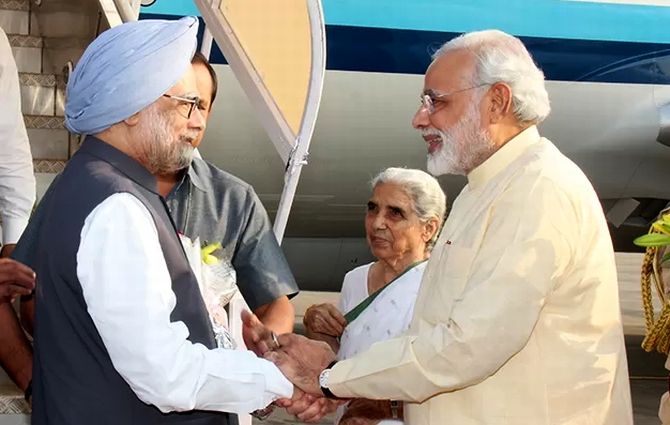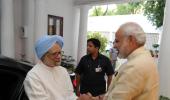Was Manmohan Singh focused too much on getting policy right, while Narendra Modi is focused essentially on getting projects moving?

Arun Maira's engaging memoir, An Upstart in Government, is well worth a read -- among other things for the comparisons that it helps us draw between the present prime minister (or government) and the last one.
Back in 2009, Manmohan Singh decided that something had to be done to promote Indian manufacturing, and invited Mr Maira (a successful manager and consultant from the private sector) to join the Planning Commission and see what he could do. Mr Maira spent the next five years trying to change the way things were done in the Commission. He got away with some innovative solutions, and pushed the acceptance of scenario-based planning.
Eventually though (if I have read him right), he had to admit defeat. Mr Modi came into office in 2014 and did it differently. He simply abolished the Planning Commission, announced a ‘Make in India’ programme, invited businessmen to get going, and set a specific indigenisation goal for defence acquisitions.
The head of a consulting company offered this comparison in a recent conversation: If the Singh government saw a problem in infrastructure development, it would ask an expert for an analytical report, and that report would be discussed extensively within government committees (remember all those GoMs?). Eventually an action plan would emerge, by which time two years would have passed.
In comparison, the Modi government's ministers in charge of the infrastructure were spotting the bottlenecks, calling in businessmen and taking decisions on specific issues. As the consultant put it, "The UPA intellectualised every problem, the NDA focuses on action. It may make mistakes, but it will get more things done."
Is this rough-and-ready characterisation of the two governments accurate, or fair?
To put it another way, was Dr Singh focused too much on getting policy right, while Mr Modi is focused essentially on getting projects moving? The corollary questions are even more relevant: what is the use of policy if projects don't materialise? And how can you do projects right without the holistic view that is provided by the framework of sensible policy?
Tom Peters, in his best-selling book of yesteryear, In Search of Excellence, argued that an important characteristic of "excellent" companies was a bias for action. On that count, the Singh government -- widely accused of "paralysis" in its second term -- is commonly perceived to have fallen short.
You could also argue that quite often the five-year Plan documents, running into hundreds of pages, became ends in themselves rather than guides to action. But then, you could equally argue that some of the Modi government's initiatives, like the auctioning of coal blocks and the Swachh Bharat initiative, have turned out to be somewhat less than the spectacular successes that enthusiastic ministers claimed them to be.
Indeed, some of the steps taken by the environment ministry to get projects going could be considered positively retrograde.
There must be a way of combining sensible policy, based on a certain worldview and an agenda, with a bias for action.
To take a current example, if you want to ban beef, it is not enough to issue such an edict, you also have to figure out what will happen to old cows or bulls that are not needed for traction. Will there be enough cow shelters where old animals will be taken care of -- or will they be left to wander around the streets of the country, looking for fodder and frequently not finding any?
There is an even further question: where will yesterday's beef-eaters turn for their protein requirements? Costly lentils?!
Similarly, you can't "clean India" without figuring out where the refuse will go, who will maintain and clean the new toilets that have been built all over the country, and where the water for that will come from.
An action-oriented programme, to be successful, needs an over-arching policy, and coordinated action.











